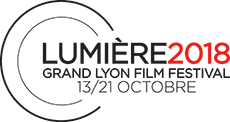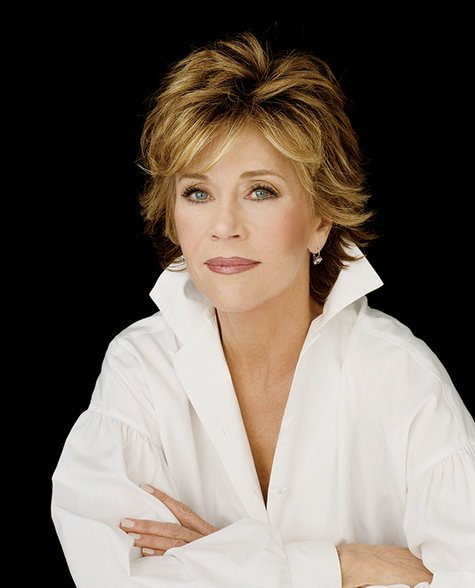Jane Fonda
Lumière Award 2018
© Andrew Eccles / August-Agence A
Actress and producer Jane Fonda will receive the Lumière Award at the next edition of the Lumière festival, to be held in Lyon and its metropolis from October 13th to 21st 2018.
Jane Fonda succeeds Wong Kar-wai, Catherine Deneuve, Martin Scorsese, Pedro Almodóvar, Quentin Tarantino, Ken Loach, Gérard Depardieu, Milos Forman and Clint Eastwood.
Watch the video
The Lumière Award is bestowed upon Jane Fonda for her acting career that has led her from Sidney Pollack to Arthur Penn, from René Clément to Roger Vadim; for her willingness to embody fierce independence from a young age, exemplified in films like Joseph Losey's A Doll’s House (based on Henrik Ibsen’s work), or Julia by Fred Zinnemann; for her singular personality that has inspired her to choose powerful, politically-committed female characters, apparent in The China Syndrome by James Bridges, or Klute by Alan J. Pakula (for which she won her first Oscar) or in Hal Ashby’s Coming Home (which earned her a second Oscar). Covered by a plethora of awards (Golden Globes, Emmy, BAFTA…), she has shone brightly in the Hollywood galaxy, without ever giving up on her beliefs.
"I am honored to be invited to the Lumière festival in Lyon," said Jane Fonda. Upon the news that she will receive this year’s Lumière Award, she declared she is "Over the moon."
Jane Fonda is a committed, life-long activist, ahead of her time as a vanguard of ideals, despite hard battles, which have skewed her image toward the pejorative in the eyes of the world. Furthermore, a symbol of struggles for freedom, anti-racism and peace, she has remained the same person, in search of herself, wondering about her own existence, weighing her successes and missteps. Such subjects are discussed in Jane Fonda in Five Acts, a wonderful documentary by Susan Lacy, to be screened during the festival before its broadcast on OCS Cinéma.
With a filmography as impressive as her roles, she is at once fragile, naive, strong, committed, a femme fatale, a mesmerizing presence, as well as funny and irreverent… Jane Fonda is an international star, an icon spanning several decades of audiences, in a world that has drastically changed. She is a resolute woman, truly of her time.
In recognizing Jane Fonda, the Lumière festival will also celebrate her family's legacy, with a special homage to her father, Henry Fonda.
The 10th Lumière Award will be presented to Jane Fonda on Friday, October 19, 2018 at the Lyon Conference Center/Salle 3000 in the presence of the French audience and a myriad of guests from around the world.
The Lumière Award was created by Thierry Frémaux and Bertrand Tavernier to celebrate a personality of the cinema in Lyon, the very place where the Cinematograph was invented by Louis and Auguste Lumière, and where they shot their first film, Leaving the Factory, in 1895. Because we must express our appreciation to the artists who fill our lives, the Lumière Award is a distinction reflecting time, gratitude and admiration.
Biographical elements
Born in New York, Jane Fonda, the daughter of actor Henry Fonda, grows up in the shadow of the myth, later joining him and her brother Peter (also a future actor and director), to comprise the Fonda clan, which America promptly elevates to a dynasty.
As a young girl, Jane Fonda takes dance and theater classes, financed by her work a model and a cover girl. In 1958, she meets Lee Strasberg and joins the Actor's Studio. In 1960, she takes her first steps on Broadway and débuts in the cinema, starring in Tall Story by Joshua Logan.
She then lines up a succession of films, working with directors Edward Dmytryk (Walk on the Wild Side, 1962), George Cukor (The Chapman Report, 1962), George Roy Hill (Period of Adjustment, 1962), Robert Stevens (In the Cool of the Day, 1963) before flying to Paris at the request of René Clément to shoot Joy House (Les Félins, 1964) with Alain Delon. In France, Jane Fonda meets Roger Vadim and becomes his companion. He writes several roles for her, including the legendary, glam-pop Barbarella, released in France and the US in October of 1968. Playing the free and adventurous title role, perfectly suited to her, she blows up the screen.
In France of 1968, Jane Fonda is aware of the political upheaval alongside friend Simone Signoret. When she returns to the United States, she embodies the character of Gloria in Sydney Pollack’s They Shoot Horses, Don’t They? This pivotal role cements her place as an international star and marks a turning point in her career.
In 1972, she wins her first Oscar for Klute (1971) by Alan J. Pakula, received in France and Europe as a feminist film. From that point forward, Jane Fonda establishes herself as an actress who plays intense roles of strong-willed women.
In her public life, she takes on a similar role; Jane Fonda is an activist committed on all fronts: pro civil rights movement, pro African-American community, pro Black Panthers, a defender of women’s rights, a protestor against the Vietnam War... She becomes one of the most high-profile figures of the politicized and chaotic America of the 1960s and 1970s and a true icon of the counterculture. Over the years, her causes will include women’s voices in the media, the rights of Native Americans, the plight of teenage mothers, the anti-nuclear stance... At the height of her activism, the FBI will track her down and compile a dossier of tens of thousands of pages.
In 1979, the committed actress wins her second Academy Award. In Hal Ashby’s Coming Home (1978), she plays Sally, a volunteer at a hospital for Vietnam veterans, torn between her husband still on the front and a former high school classmate wounded in action. Her deft performance in the activist film has been universally lauded.
Jane Fonda has worked with some of the greatest filmmakers: Joshua Logan, Edward Dmytryk, George Cukor, George Roy Hill, Robert Stevens, René Clément, Roger Vadim, Arthur Penn, Otto Preminger, Sydney Pollack, James Bridges, Jean-Luc Godard, Joseph Losey, Ted Kotcheff, Fred Zinnemann, Hal Ashby, Alan J. Pakula, Norman Jewison, Sidney Lumet, Luis Puenzo, Martin Ritt… Paolo Sorrentino offers her a part in Youth, where in the space of a few scenes, we witness the full measure of her talent, which has remained intact.
In 1981, she stars with her father in Mark Rydell's On Golden Pond, Henry Fonda's last movie role, earning him his first Oscar a few months before his death.
After a break of more than a decade, during which she had become the worldwide face of aerobics (profits from her 17 million videos sold have gone toward her political activities), Jane Fonda has been back on the screen since 2005, as a film and television actress (enjoying great success and enormous renewed popularity) and as a producer.
Former Lumière award recipients:
Clint Eastwood Lumière Award 2009 [vidéo]
Milos Forman Lumière Award 2010 [vidéo]
Gérard Depardieu Lumière Award 2011 [vidéo]
Ken Loach Lumière Award 2012 [vidéo]
Quentin Tarantino Lumière Award 2013 [vidéo]
Pedro Almodóvar Lumière Award 2014 [vidéo
Martin Scorsese Lumière Award 2015 [vidéo]
Catherine Deneuve Lumière Award 2016 [vidéo]
Wong Kar-wai Lumière Award 2017 [vidéo]




